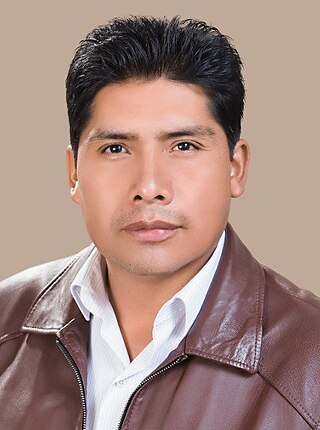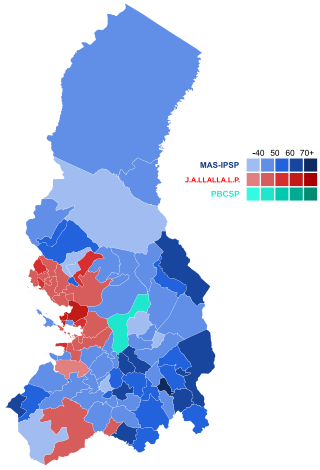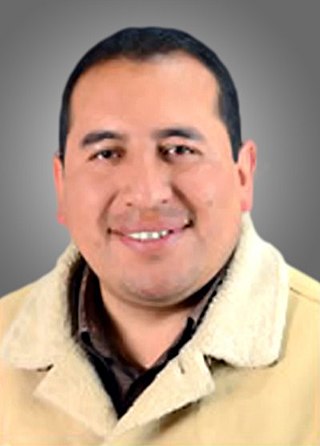
Adriana Salvatierra Arriaza is a Bolivian political scientist and politician who served as president of the Senate in 2019. A member of the Movement for Socialism, she served as senator for Santa Cruz from 2015 to 2020 and was a substitute senator for Santa Cruz under Carlos Romero in 2015. At age twenty-nine, Salvatierra was the youngest legislator and third woman to hold the presidency of the Senate and was the youngest individual to ever exert presidential authority, albeit briefly in an acting capacity.

Jeanine Áñez Chávez is a Bolivian lawyer, politician, and television presenter who served as the 66th president of Bolivia from 2019 to 2020. A former member of the Social Democratic Movement, she previously served two terms as senator for Beni from 2015 to 2019 on behalf of the Democratic Unity coalition and from 2010 to 2014 on behalf of the National Convergence alliance. During this time, she served as second vice president of the Senate from 2015 to 2016 and in 2019 and, briefly, was president of the Senate, also in 2019. Before that, she served as a uninominal member of the Constituent Assembly from Beni, representing circumscription 61 from 2006 to 2007 on behalf of the Social Democratic Power alliance.

Mónica Eva Copa Murga is a Bolivian politician, social worker, and former student leader serving as mayor of El Alto since 2021. As a member of the Movement for Socialism, she previously served as senator for La Paz from 2015 to 2020, during which time she was president of the Senate from 2019 to 2020.

Rafael Arcángel Quispe Flores, often referred to as Tata Quispe, is a Bolivian indigenous activist and politician who served as general executive director of the Indigenous Development Fund from 2019 to 2020. He previously served as a substitute party-list member of the Chamber of Deputies from La Paz under María Eugenia Calcina from 2015 to 2019.

Andrónico Rodríguez Ledezma is a Bolivian cocalero activist, political scientist, politician, and trade unionist serving as president of the Senate since 2020. A member of the Movement for Socialism, he serves as senator for Cochabamba. Rodríguez's lengthy career in the cocalero union hierarchy saw him serve as general secretary of the 21 September Workers' Center from 2015 to 2016 and as executive of the Mamoré Bulo Bulo Federation from 2016 to 2018, in addition to a multitude of other minor positions. He has served as vice president of the Coordination Committee of the Six Federations of the Tropic of Cochabamba since 2018 and held office as president of the organization from 2019 to 2020 in the absence of the body's longtime leader, Evo Morales.

Oscar Miguel Ortiz Antelo is a Bolivian businessman and politician who served as minister of economy and public finance from July to September 2020 and as minister of productive development from May to July 2020. As a member of the Social Democratic Movement, he previously served two terms as a senator for Santa Cruz from 2015 to 2020 on behalf of the Democratic Unity coalition and from 2006 to 2010 on behalf of the Social Democratic Power alliance. Nearing the end of his second term, Ortiz was his party's presidential candidate, attaining fourth place in the annulled 2019 general elections. During his first term, he served as president of the Senate from 2008 to 2010, the last opposition legislator to preside over the upper chamber as of 2024. Outside of national politics, Ortiz served as president of the Union of Latin American Parties from 2018 to 2021 and has been the rector of the Bolivian Catholic University at Santa Cruz since 2021.

Yerko Martín Núñez Negrette is a Bolivian agronomist and politician who served as minister of the presidency from 2019 to 2020. A member of the Social Democratic Movement, he previously served as minister of public works from November to December 2019. Throughout his ministerial tenure, Núñez was noted as a key person of influence in the transitional government and a "right-hand" to President Jeanine Áñez, a fellow Beni native. Prior to his appointment, he served as senator from Beni from 2015 to 2019 on behalf of the Democratic Unity coalition. As a member of Beni First, Núñez served as mayor of Rurrenabaque from 2010 to 2014; he previously held the position for two terms from 2000 to 2003 and 2005 to 2010 as part of the Revolutionary Nationalist Movement. Núñez's mayoral tenure saw strides made for Rurrenabaque's ecotourism industry, which generated increased economic growth for the city.

The 2021 Bolivian regional elections were held on 7 March 2021. Departmental and municipal authorities were elected by an electorate of approximately 7 million people. This was the third regional election under the 2009 constitution. It was postponed from the expected date of 2020 due to the 2019 Bolivian political crisis and delays in holding the 2020 Bolivian general election. All elected authorities assumed office on 3 May.
The 2021 El Alto municipal election was held on Sunday, 7 March 2021, to elect the mayor and eleven councillors to the El Alto Municipal Council. Incumbent Mayor Soledad Chapetón was eligible to seek a second term but declined for personal reasons. Fourteen fronts presented candidates. In the election, Eva Copa of the Jallalla La Paz civic group handily defeated Movement for Socialism nominee Zacarías Maquera and thirteen other candidates with 68.70% of the vote to become El Alto's mayor.
Events from the year 2022 in Bolivia.

Santos Quispe Quispe, commonly known as Wayna Mallku, is a Bolivian doctor and politician serving as governor of La Paz since 2021. A member of Forward United People, of which he is the leader, Quispe was a relative unknown in politics until he replaced his late father, the renowned peasant leader Felipe Quispe, as Jallalla La Paz's candidate for the governorship of the La Paz Department. Shortly after winning the election, Quispe terminated his party's pact with Jallalla, establishing a confrontational attitude with the Departmental Assembly for the duration of his term. In early 2022, he was sentenced to house arrest with the right to work after being discovered allegedly intoxicated at his office.

Carolina Ribera Áñez is a Bolivian dentist who served as the presidential representative in the Social Support and Management Unit of the Ministry of the Presidency from 2019 to 2020 under Jeanine Áñez. Ribera is the eldest daughter of former president Jeanine Áñez and former Trinidad mayor Tadeo Ribera. Ribera protests Áñez's incarceration on various criminal charges in 2021, denouncing alleged violations of her mother's human and legal rights.

Beatriz Eliane Capobianco Sandoval is a Bolivian lawyer and politician who served as minister of rural development and lands from January to November 2020. A member of the Social Democratic Movement, she previously served as a party-list member of the Chamber of Deputies from Santa Cruz from 2015 to 2019 on behalf of the Democratic Unity coalition. Before that, she served as a member of the Constituent Assembly from Santa Cruz, representing circumscription 51 from 2006 to 2007 on behalf of the Social Democratic Power alliance. A professional in cadastre and land and real estate registration, Capobianco held numerous positions linked to Santa Cruz's agribusiness sector, including serving twice as departmental director of the National Institute of Agrarian Reform, first from 2001 to 2002 and again from 2019 to 2020.
The 2021 La Paz municipal election was held in La Paz, Bolivia on Sunday, 7 March 2021, involving separate contests for mayor and all eleven municipal council seats. Incumbent mayor Luis Revilla was eligible to seek a third term but declined, leaving the mayoralty an open contest. The election was won by former minister of public works Iván Arias of the alliance, who attained a near absolute majority of 49.52 percent against a field of ten other candidates. On the municipal ballot, Somos Pueblo won 48.04 percent of the vote, winning the six seats needed to exercise a simple majority on the municipal council, with the Movement for Socialism taking the remaining five seats. Revilla's party, Sovereignty and Liberty, lost both the mayoralty and all representation on the municipal council, concluding a twenty-year period of political continuity that started in 2000 with the assumption of Juan del Granado.

Franklin Richar Flores Córdova is a Bolivian politician, trade unionist, and former student leader serving as general manager of the Food Production Support Enterprise since 2021. A member of the Movement for Socialism, he previously served as a member of the Chamber of Deputies from La Paz, representing circumscription 18 from 2015 to 2020. Before that, he served as a Sica Sica municipal councillor from 2010 to 2014, during which time he held office as the body's president. In 2021, Flores was his party's candidate for governor of La Paz, placing second in that year's gubernatorial election.

The 2021 La Paz gubernatorial election was held on Sunday, 7 March 2021, with a runoff taking place on 11 April 2021, involving separate contests for governor and all forty-five seats in the Departmental Legislative Assembly. Incumbent governor Félix Patzi unsuccessfully sought reelection to a second term, finishing in fourth place with 4.36 percent of the popular vote. The election was won by Jallalla La Paz's Santos Quispe, who attained 55.23 percent of the vote in the second round, defeating Franklin Flores of the Movement for Socialism. On the legislative ballot, the Movement for Socialism won sixteen of the twenty provincial circumscriptions and nine of the twenty party-list seats, retaining its twenty-five seat majority in the Legislative Assembly.

Freddy Mamani Laura is a Bolivian educator, politician, and trade unionist who served as president of the Chamber of Deputies from 2020 to 2022. A member of the Movement for Socialism, he has served as a party-list member of the Chamber of Deputies from La Paz since 2020. He previously served as executive secretary of the National Confederation of Rural Teachers of Bolivia and as departmental executive of the Federation of Rural Teachers of La Paz. Prior to entering politics, Mamani worked as a teacher, serving as the principal of various rural schools in the department.

Lidia Patty Mullisaca is a Bolivian politician and trade unionist. A member of the Movement for Socialism, Patty represented La Paz in the Chamber of Deputies, first as a substitute alongside Manuel Canelas from 2015 to 2018 and later as a voting member until 2020. She later served as consul of Bolivia to Puno, Peru, in June 2023 and has been vice consul of Bolivia in La Plata, Argentina, since September 2023.

Wilson Pedro Santamaría Choque is a Bolivian lawyer, politician, and sociologist who served as vice minister of public security from 2019 to 2020. A graduate of the Higher University of San Andrés with extensive postgraduate studies, Santamaría entered the political field as a partisan of the National Unity Front and served as the party's municipal leader for La Paz. In 2014, he was elected as a party-list member of the Chamber of Deputies, representing the La Paz Department from 2015 to 2019.
The following is a chronology of notable events from the year 2023 in Bolivia.





















